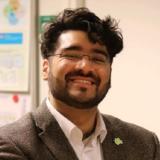Authenticity in the Digital Age
When we call something authentic we consider it to be real and true. However, our comprehension of truth has been challenged over the years by emerging technologies, that we readily rely on. How to be authentic in the digital age? Join this Flow symposium and find out. (English / SG-Certificate*)
Time: 13:00-15:30 hrs.
Admission is free, no registration required.
Digitalization beyond truth
We live in an era in which digitalization has impacted us as deeply as affecting our perception of what is real and true. For example, we believe that our navigation app is giving us the fastest route to our destination, even though we’ve definitely been proven otherwise. Still, we blindly trust it. This is only a small, relatively innocent example, but smart algorithms are now present in many essential products and institutions, such as health care, education, (social) media and even in some legal sectors. We let them make important decisions for us and in the process, we often forget that they are created to nudge us towards certain (by companies) desired behavior. Can we even still make our own autonomous and authentic decisions? Or have we burned these bridges a long time ago? Let’s talk about it during this ‘Authenticity in the Digital Age’ symposium.
After the symposium there will be an optional drink at Grand Café Esplanade.
Speakers
-

Eric Postma
Professor Artificial Intelligence at the Cognitive Science & AI department, Tilburg UniversityEric Postma is professor Artificial Intelligence at the Cognitive Science & AI department at Tilburg University and at the Jheronimus Academy of Data Science in ‘s-Hertogenbosch. His research interests focus on human perception and cognition, and the modelling thereof with AI techniques. He also teaches several courses on AI, and often gives “down-to-earth” lectures for organizations and industry on the latest developments and impact of AI. During his talk, Eric will focus on how AI can be used to authenticate and forge artworks. The presentation provides an overview of the state of the art in both respects and discusses the wider implications of the upsurge of discriminative and generative AI for the notion of authenticity.
-

Haroon Khan
Lecturer, Tilburg Institute for Law, Technology, and SocietyHaroon Khan is lecturer at the Tilburg Institute for Law, Technology, and Society. Haroon's main areas of interest include AI and AI ethics, 3D printing technology, and techno regulation. His graduate thesis and personal research interests revolve in large part around the relationship between homemade firearms and additive manufacturing, and the potential expansion of gun control legislation to include the possession of wiki-weapon blueprints. Haroon will discuss the non-neutrality and biased decision making of AI, along with the ways that it can be categorized in order to more effectively regulate it. He will cover case studies on AI bias as well as invite attendees to think of their own examples of how technology can be used, intentionally or otherwise, to propagate a narrative of discrimination and what the legal implications of these discriminatory decision making processes are.
-

Siddharth Mehrotra
PhD candidate at the Interactive Intelligence group, Delft University of TechnologySiddharth Mehrotra is a PhD candidate at the Interactive Intelligence group at Delft University of Technology. Prior to his PhD, he completed his master’s in media informatics from RWTH Aachen University. His research interests are at the intersection of Human Computer Interaction, Artificial Intelligence, and Computational Social Science, and their application in domains such as AI enabled personal assistance and policymaking. In his research, Siddharth focusses on designing appropriate trust in human-AI interaction, for which he builds AI agents that can guide humans to appropriately trust AI and augment human agency. During his talk, he will explain how authentic data can contribute to our trust in computer systems.
More information
This symposium is organized by Studium Generale in cooperation with Study Association Flow and MindLabs - Where Minds, Media, Technologies meet (mind-labs.eu).
Contact: Hannah van den Bosch (Studium Generale).
* For students, this lecture may count towards the SG-Certificate. Check the SG-Certificate website for all the terms and conditions.
